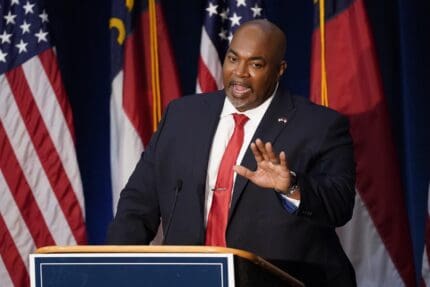Meet the trade group fighting against clean energy standards
The National Association of Home Builders contributes millions of dollars to Republican lawmakers.

Home costs are skyrocketing and improved energy standards could help, but a lobbying group and its Republican benefactors are standing in the way of their implementation.
The National Association of Home Builders represents the interests of homebuilders, developers, and contractors. Their affiliated PAC donates to both major parties, but since 2012, their annual contributions to Republicans have been more than double what they’ve given to Democrats. In 2016 and 2018, it was more than quadruple.
Nearly one in three households struggles to pay its energy bills. Outdated building codes that allow builders to install inadequate insulation and technologies that use expensive fossil fuels are a significant factor in this crisis. At both the state level and the federal level, the NAHB has pushed for and even provided lawmakers with model texts for legislation to keep these outdated codes in place. Their goal is to keep construction costs low, even if it means higher costs for homeowners.
A prime example of this dynamic played out recently in North Carolina. In 2023, the state government’s Building Code Council was poised to adopt updated energy efficiency standards for new homes. Among the proposed changes were stricter rules for heating and cooling systems that would have reduced reliance on fossil fuels. Democratic Gov. Roy Cooper endorsed the changes.
But in June, the Republican-controlled General Assembly passed a bill blocking that effort. In July, North Carolina public radio station WUNC obtained emails via a public records request that showed a NAHB lobbyist had advised Republican lawmakers on the language of the bill.
Cooper vetoed the bill. In August, the General Assembly voted to override his veto.
In 2019, the New York Times reported on a secret agreement between the NAHB and the International Code Council, a nonprofit organization that recommends building codes that are often adopted nationwide. In 2002, the International Code Council agreed to give the NAHB four of the 11 voting seats on two of its committees. According to the New York Times, the NAHB representatives on these committees consistently opposed increased energy efficiency standards.
The NAHB wields influence in Congress as well. In September, Sen. Marco Rubio (R-FL) introduced an amendment to prohibit the Department of Housing and Urban Development from updating energy efficiency standards. In 2022, Rubio received more money in donations from the home building industry than any other U.S. senator, including from several member companies of the NAHB.
The NAHB opposition to improved energy standards is now facing backlash from a diverse array of organizations.
In October, a coalition of energy, consumer, environmental justice and health advocacy groups signed on to a letter opposing Rubio’s amendment. In November, many of those same groups signed a letter urging the Federal Housing Finance Agency to require new homes with federally backed mortgages to have cleaner energy standards.
According to a white paper published by the nonprofit American Council for an Energy-Efficient Economy, clean energy standards for new homes would reduce a homeowner’s total cost over time.
A representative of the NAHB did not immediately respond to a request for comment for this article.
Recommended

Republican Jay Ashcroft backs anti-abortion clinics that push lies and disinformation
The Republic Pregnancy Resource Center website provides step-by-step directions from local middle and high schools to their address.
By Jesse Valentine - May 14, 2024
More than half of Republican Jay Ashcroft’s funding comes from outside Missouri
Ashcroft has criticized other campaigns for relying on out-of-state donors
By Jesse Valentine - April 25, 2024
Battleground GOP candidates rally around Trump’s tax cuts for the rich
Even Larry Hogan, a Trump critic, supports the former president’s tax policy.
By Jesse Valentine - April 12, 2024



















































































